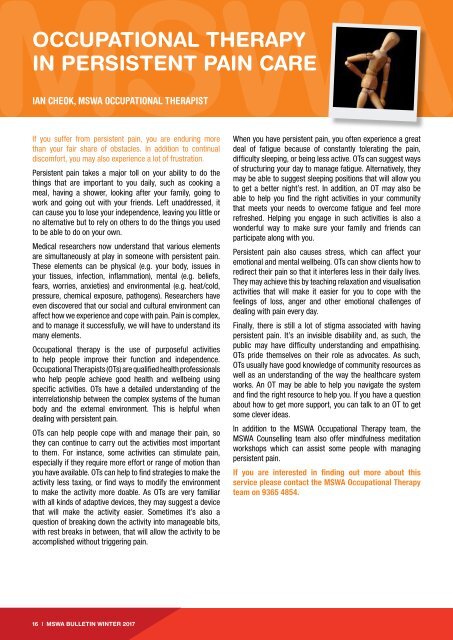MSWA Bulletin Magazine Winter 2017
Create successful ePaper yourself
Turn your PDF publications into a flip-book with our unique Google optimized e-Paper software.
OCCUPATIONAL THERAPY<br />
IN PERSISTENT PAIN CARE<br />
IAN CHEOK, <strong>MSWA</strong> OCCUPATIONAL THERAPIST<br />
If you suffer from persistent pain, you are enduring more<br />
than your fair share of obstacles. In addition to continual<br />
discomfort, you may also experience a lot of frustration.<br />
Persistent pain takes a major toll on your ability to do the<br />
things that are important to you daily, such as cooking a<br />
meal, having a shower, looking after your family, going to<br />
work and going out with your friends. Left unaddressed, it<br />
can cause you to lose your independence, leaving you little or<br />
no alternative but to rely on others to do the things you used<br />
to be able to do on your own.<br />
Medical researchers now understand that various elements<br />
are simultaneously at play in someone with persistent pain.<br />
These elements can be physical (e.g. your body, issues in<br />
your tissues, infection, inflammation), mental (e.g. beliefs,<br />
fears, worries, anxieties) and environmental (e.g. heat/cold,<br />
pressure, chemical exposure, pathogens). Researchers have<br />
even discovered that our social and cultural environment can<br />
affect how we experience and cope with pain. Pain is complex,<br />
and to manage it successfully, we will have to understand its<br />
many elements.<br />
Occupational therapy is the use of purposeful activities<br />
to help people improve their function and independence.<br />
Occupational Therapists (OTs) are qualified health professionals<br />
who help people achieve good health and wellbeing using<br />
specific activities. OTs have a detailed understanding of the<br />
interrelationship between the complex systems of the human<br />
body and the external environment. This is helpful when<br />
dealing with persistent pain.<br />
OTs can help people cope with and manage their pain, so<br />
they can continue to carry out the activities most important<br />
to them. For instance, some activities can stimulate pain,<br />
especially if they require more effort or range of motion than<br />
you have available. OTs can help to find strategies to make the<br />
activity less taxing, or find ways to modify the environment<br />
to make the activity more doable. As OTs are very familiar<br />
with all kinds of adaptive devices, they may suggest a device<br />
that will make the activity easier. Sometimes it’s also a<br />
question of breaking down the activity into manageable bits,<br />
with rest breaks in between, that will allow the activity to be<br />
accomplished without triggering pain.<br />
When you have persistent pain, you often experience a great<br />
deal of fatigue because of constantly tolerating the pain,<br />
difficulty sleeping, or being less active. OTs can suggest ways<br />
of structuring your day to manage fatigue. Alternatively, they<br />
may be able to suggest sleeping positions that will allow you<br />
to get a better night’s rest. In addition, an OT may also be<br />
able to help you find the right activities in your community<br />
that meets your needs to overcome fatigue and feel more<br />
refreshed. Helping you engage in such activities is also a<br />
wonderful way to make sure your family and friends can<br />
participate along with you.<br />
Persistent pain also causes stress, which can affect your<br />
emotional and mental wellbeing. OTs can show clients how to<br />
redirect their pain so that it interferes less in their daily lives.<br />
They may achieve this by teaching relaxation and visualisation<br />
activities that will make it easier for you to cope with the<br />
feelings of loss, anger and other emotional challenges of<br />
dealing with pain every day.<br />
Finally, there is still a lot of stigma associated with having<br />
persistent pain. It’s an invisible disability and, as such, the<br />
public may have difficulty understanding and empathising.<br />
OTs pride themselves on their role as advocates. As such,<br />
OTs usually have good knowledge of community resources as<br />
well as an understanding of the way the healthcare system<br />
works. An OT may be able to help you navigate the system<br />
and find the right resource to help you. If you have a question<br />
about how to get more support, you can talk to an OT to get<br />
some clever ideas.<br />
In addition to the <strong>MSWA</strong> Occupational Therapy team, the<br />
<strong>MSWA</strong> Counselling team also offer mindfulness meditation<br />
workshops which can assist some people with managing<br />
persistent pain.<br />
If you are interested in finding out more about this<br />
service please contact the <strong>MSWA</strong> Occupational Therapy<br />
team on 9365 4854.<br />
16 | <strong>MSWA</strong> BULLETIN WINTER <strong>2017</strong>


















